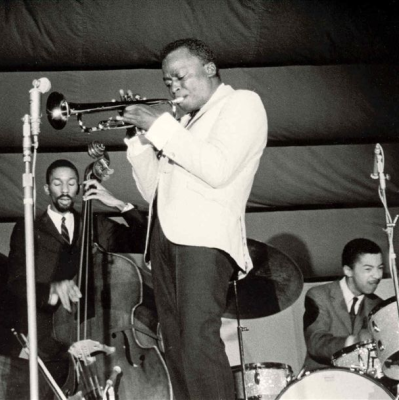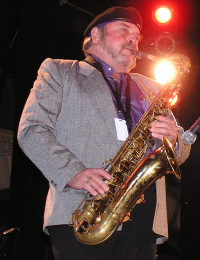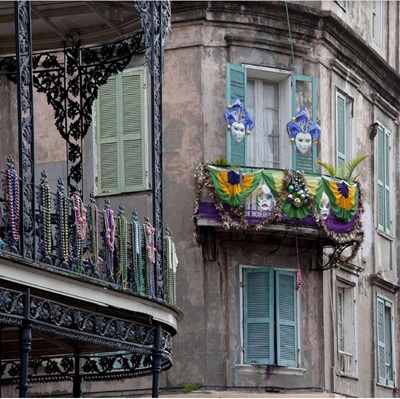.
.
Mallory1180, CC BY-SA 4.0 , via Wikimedia Commons

Miles Davis at Antibes, 1963
.
___
.
Miles Davis
in the nosebleed seats
of the Palais de Chaillot in Paris
long past the announced start time
fans from France, UK, US,
Germany, Scandinavia, and beyond
debate in surprisingly good English
the relative merits of
Sketches of Spain versus
Filles de Kilimanjaro
and Birth of the Cool
house lights finally dim
and hip-looking musicians
amble onstage one at a time
in the semi-darkness far below
chatting and killing time
doing sound-checks
without Miles
stage lights finally brighten
electric bass and keyboard licks
by Henderson and Jarrett
and random cymbal splashes
and drum clunks from Chancler
slowly coalesce into a medium groove
lacking all structure
still no Miles
a blue haze of pot smoke
floats above the footlights
as the band riffs
on funky wallpaper music
wa-wa sounds front and center
with no lead voices
discernible melodies
or harmonic patterns to anchor it
heads bob
feet tap
where’s Miles?
scattered whistles greet a lone figure
emerging at length without fanfare
from behind the proscenium, stage right
a pin-spot finds Miles looking skeletal
in a billowy shirt, velvet pants
straggly hair and sunglasses
he drifts slowly towards center-stage
stands a few minutes
absorbing the groove
his “lost septet” sidemen are laying down
finally raises his horn slightly
head down
chin on chest
pelvis forward
knees slightly bent
he begins to play
tentatively at first
gradually easing into an extended soliloquy
that never really finds form
or takes flight
lacking anything like
the spirit and assertive gestures
of Bitches Brew
we had hoped to hear
like a preacher
constantly losing his train of thought
this sermon winds down in disarray
a lackluster performance
that trails off unconvincingly
after twenty minutes or so
and voilà, that’s all she wrote
after half-hearted applause
we file out disappointed
past hundreds more
lined up for the second show
unaware that the voodoo priest
has no magic in him tonight
but will accept their offerings
all the same
.
by Tim Maloney
.
.
___
.
.
A Tale of My Dad’s Influence & an Underground Jazz Legend & a Restaurant in Venice Beach, CA
I remember once sorting through
Some of my Dad’s old records &
Finding something I just had to
Know more about…
“Dad,” I said, “who is this Phil
Upchurch?” & my Mum burst
Out laughing as if I’d stumbled
Across some secret joke.
“Oh yeah,” he replied, from behind
His newspaper, “your Mum never
Appreciated my good music!” he
Joked as I turned the disc over.
“Can I borrow it?” I asked. “No
Son, not that one I’m afraid! It’s
Far too precious to be played &
I just know I’ll never find it again!”
And that, or as far as I could tell,
Was that…
Until many, many years later & I
Turned the joke back on my
Parents. I was off out galivating
Around the globe as I did on
Occasion back then…
Landed at LAX, got a taxi to my
Hotel & on my way in I grabbed
A freebie paper with a whole bunch
Of listings & shock, horror there
He was…
Phil Upchurch live at his piano
At Hal’s Bar, Venice Beach & I
Just knew I had to be there & as
I phoned home the next morning I
Couldn’t wait to tell my Dad &
He didn’t believe me until I
Showed him the clipping & for
The first time ever my Dad was
Dumbfounded at what he saw!
Phil, the legend, who’d played
With Mose Allison, Jimmy Smith,
Stan Getz, Dizzy Gillespie &
Prime-time Howlin’ Wolf, reduced
To sell his talent on a no-cover
Entry & the greatness of the
Caesar salads to get a besuited
Crowd through the door as I sat
There in thrall of this underground
Legend.
.
by Bradford Middleton
.
.
___
.
.
Things Were Different Back Then
Things were different back then.
Sitting on the grass or a lawn chair at Newport.
There was no hate, crime, or violence of any sort.
Three things filled the air.
The music, the familiar aroma of freshly rolled joints,
The love, and the care.
Everyone there loved everybody else.
Those who were dancing were thought to be insane
By the others who were too stoned to hear the music.
“Was that Byrd, or was that Trane?”
Things were different back then. Just not the same.
Suddenly, much to the fans horror and pity,
It was announced Newport was moving to New York City.
Did it matter? Would we still attend?
Some said yes, while others said no,
Until they read the lineup of artists at the shows.
Far more expensive than Newport,
They managed to find the funds.
After all, it’s only money, why sacrifice the fun?
We waited in line to see Miles at Avery-Fisher Hall.
A jazz performance at Julliard, by the best trumpet of all.
Much to the fans dismay, the band began to play,
But with no tempo, like a symphony orchestra tuning up.
Seemed like forever, Miles’ horn aimed at the floor.
After half an hour, the fans one by one, headed back to the door.
Some wondered, while some bitterly complained.
Others moaned, “To hell with him. If only we had Trane.”
Carnegie Hall had a sold out crowd.
The buzz of the audience suddenly became loud
With applause and cheers when Dave Brubeck walked out.
During his performance, a young man with no shoes
Jumped up and onto the stage, too young to pay dues,
And much to the fans annoyance and rage,
They turned watching for security.
With long blonde hair and torn blue jeans
Which yielded a harmonica from the side.
Much to everyone’s surprise, he grabbed a mic.
And took one hell of a ride,
Playing like a mad man on that harp.
One by one, the fans all stood,
The cheers and applause heard over in Hollywood.
When it was over, the young man took a bow,
signaling he was done, and Dave got up and announced,
“This boy is my son.”
Things were different back then.
Spent a summer in Vermont,
Back in about nineteen seventy-two,
Grown tired of the city, worn out with the blues.
Chanced upon a hiker on the side of a country road.
He opened the door, then tossed in his load.
I then asked where he would like to go.
He replied, “To a jazz-fest on the ski slopes of Glen Ellen.
Promises to be one hell of a show.”
When he mentioned the lineup, how could I go wrong?
So I asked the lad, “Mind if I come along?”
Friends there from Newport, all sitting on the slope,
Smiling and laughing, passing around the dope.
There was Esther Satterfield, with Chuck Magione.
Bill Watrous, with his rapid fire trombone.
Eddie Harris performed. Where’s Les McCann?
Cold Duck ain’t the same, without that Swiss Movement band.
Buddy Rich, with his most talented band.
The lineup seemed endless. It was all simply grand.
Maynard Ferguson, high notes up in the stratosphere,
Whiplash changes of tempos, so bold without fear.
Maynard was my hero, now playing in a higher place.
Second chair only to Gabriel. Hell, that’s no disgrace.
Things were different back then. It all went so fast.
.
by T.W. Parrish
.
.
_____
.
.

Tim Maloney is a musician, author, and retired arts administrator living in the Hudson Valley, whose poetry has been published in Bare Root Review, Fortunate Traveller, Ilya’s Honey, Leaflets, Muskeg Review, Poetry On and Off the Wall, Red River Review, Silver Birch Press, Syncopation Literary Journal, and The Talking Stick.
.
.
___
.
.

Bradford Middleton lives in Brighton on England’s south coast. Recent poems have been published at Mad Swirl, A Thin Slice of Anxiety, Blotter Rag, Dear Booze, Fixator Press and in the Acid Bath anthology ‘Night Terrors’. His most recent book came out last year from the Alien Buddha Press.
.
.
___
.
.
.

T.W. Parrish was formally educated in music performance. He writes original songs and performs equally well on trumpet, tenor sax, flute, and vocals. He’s performed in 47 states and abroad with some of the biggest names in entertainment. Originally from Fla., lived 16 years in Seattle, now retired in Lake of Ozarks, Missouri, playing occasionally in Kansas City. He has also written four books with painted illustrations. His favorite bands are Tower of Power and Poncho Sanchez, and his favorite music is Latin Jazz and Be Bop.
.
.
___
.
.
Click for:
More poetry on Jerry Jazz Musician
“My Vertical Landscape,” Felicia A. Rivers’ winning story in the 69th Jerry Jazz Musician Short Fiction Contest
More short fiction on Jerry Jazz Musician
Information about how to submit your poetry or short fiction
Subscribe to the (free) Jerry Jazz Musician quarterly newsletter
Helping to support the ongoing publication of Jerry Jazz Musician, and to keep it commercial-free (thank you!)
.
___
.
.
Jerry Jazz Musician…human produced since 1999
.
.
.











































